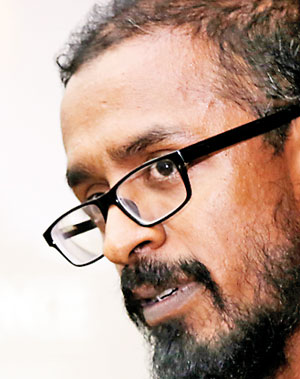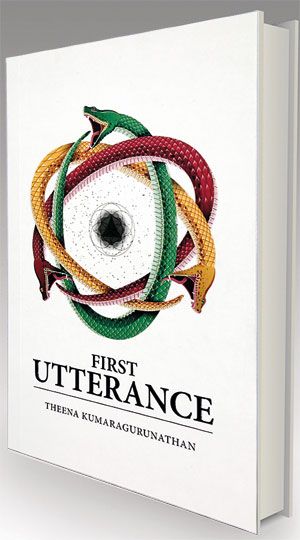An ambitious, genre-bending novella

Theena Kumaragurunathan Pix by M.A Pushpa Kumara
If there’s one thing Theena Kumaragurunathan doesn’t lack for, it’s ambition. He makes his literary debut with First Utterance, a novella and the first in a proposed Miragian trilogy. Theena’s eclectic inspirations feed into a genre-bending work which combines poetry, prose and a play to tell a story of a civilization on the verge of oblivion. Below are excerpts from the author’s interview with the Sunday Times.
n You credit your father with inspiring your interest in literature. Did he fuel your ambition to become a writer?
My dad wrote Tamil poetry and briefly worked as a lyricist, collaborating with musicians and other writers as well I think. This is before he got married and we, my sister and I, came in. So growing up we had a lot of books – Tamil literary journals from the 80s, his manuscripts, anthologies – you name it. We never discussed writing actually, I think he was just glad that he made readers out of both his kids. That’s the biggest battle in my view.
n You write: ‘Sometimes books we read tell us more of our fate than all the soothsayers in the world.’ I’m curious about the books that inspired you to write a novella that so blithely blurs genre boundaries.
I am happy you picked up on that line from First Utterance. The two books that really shook me, at very different stages of life, were reading Sir Arthur C. Clarke’s 2001: A Space Odyssey when I was around 15, and reading Gabriel Garcia Marquez’s One Hundred Years of Solitude when I was 26. 2001 – a book I find myself returning to even as an adult – was the one that made me a reader; and One Hundred Years of Solitude is the one that pushed me to see if I could write a novel, but do it in a way that would satisfy the reader and the writer in me.
In the case of One Hundred Years, it was by my side in the weeks when my dad’s health plummeted and without it, without its characters, without Marquez’s humanity, I wouldn’t have had the perspective to deal with my dad’s passing away at the time. It is a special book written by an incredible writer and that particular copy is almost always by my side.
n Writing this book – constructed of five short stories, three poems and one play – has to have posed its own technical challenges. How much of this structure evolved organically and how much of it was predetermined?
There was a bit of both. I started writing First Utterance with poetry as the springboard. In terms of the writing process, I wrote the short stories in isolation to one another. The reason I did that was because the three protagonists, the ‘mad men’, are unnamed until much later in the book – so I had three men of differing ages, with severe existential and psychological crisis to deal with. The trick was to ensure that each would be distinguishable to the reader, that I would do justice to their individual plights.
I played around with the ordering of the stories and poems until I settled on an ordering that created an organic and fairly neat story. The challenge was to finish it well and that is why Our Last Tomorrow, the final chapter, ended up doing the hard work of tying everything together.
n The three mad men, on whom the fate of the world rests in your novel, are inscrutable and compelling. What about mental illness and the way we grapple with it as a society inspired you to create characters who had the power to challenge the status quo?
The idea of madness as a theme came because of a chance encounter with Michel Foucalt’s On Madness and Civilization. Foucalt’s writing is difficult to penetrate but essentially he traces the evolution of how madness was viewed by Western society from the Renaissance period to the beginnings of modern European society: the ‘mad’ go from being viewed as bequeathed with some special wisdom to outsiders who must be segregated and herded away from polite society.
Though much has changed, there are still parts of the world that view the mentally handicapped in similar terms. I thought it would be an interesting idea to explore: use a myth-inspired fear for increasingly political mechanizations where anyone, even political opponents and critics in the media, can be labelled as ‘mad’ and thus chucked away to never be heard or seen from again.
n In what ways did Sri Lanka’s politics and history feed into your writing? The references to the lost generation and the abductions, as well as the collaboration and confrontation between political and religious factions resonate in interesting ways.
I believe that Sri Lanka’s mythological foundations are fertile ground for mining stories that resonate within our present day and time. And honestly I know very little of Sri Lankan mythology but what I wanted to do with First Utterance was for Mirage to mirror the sometimes surreal ways mythology is used in Sri Lanka’s political discourse. And the fact is our political establishment is very much dependent on the clergy. Once that idea started taking shape, the rest was a product of its time.
n Tell us about the trilogy. When will the next books be released and how will we see the Miragian universe evolve?
Mirage’s fate is karmic: essentially the cycles in ‘The Miragian Cycles’ refer to Mirage’s destiny which is to go through the cycle of death and rebirth – as a people, as a culture, and as a nation-state – repeatedly. First Utterance spans one such cycle, from the beginning to the end. The next book will pick up towards the end of another cycle, but in a vastly different, more secular society. The pressure points for Miragian society will be less mythical and more political, scientific and economic, but at its heart Book II is a love story. I can’t wait to get back to writing it.
I’d say the next book is about two years away. It is going to be a full blown novel, unlike First Utterance’s novella form.
n You self-published this book – it’s meticulously laid out and has some unique design elements. What was your experience of the process and what have you learned from it?
When I made the decision to self-publish I also told myself that I wouldn’t take any shortcuts with the design. It had to look as good and read as well as a book from, say, Penguin’s portfolio. I was lucky because I am a communications professional and work in advertising. I commissioned three veteran art directors to be in charge of various aspects of the book and its subsequent marketing. Madhri Samaranayake designed The Triad of Ancestors (the snakes in the act of consuming their own tails), Suranga Fernando did the laying out of the copy while Daran Kandasamy brought everything together into a cohesive visual whole. They were all brilliant.
In the end, I couldn’t have asked for a better final print of the book or the various marketing material that’s come out. : http://firstutterancebook.com/


